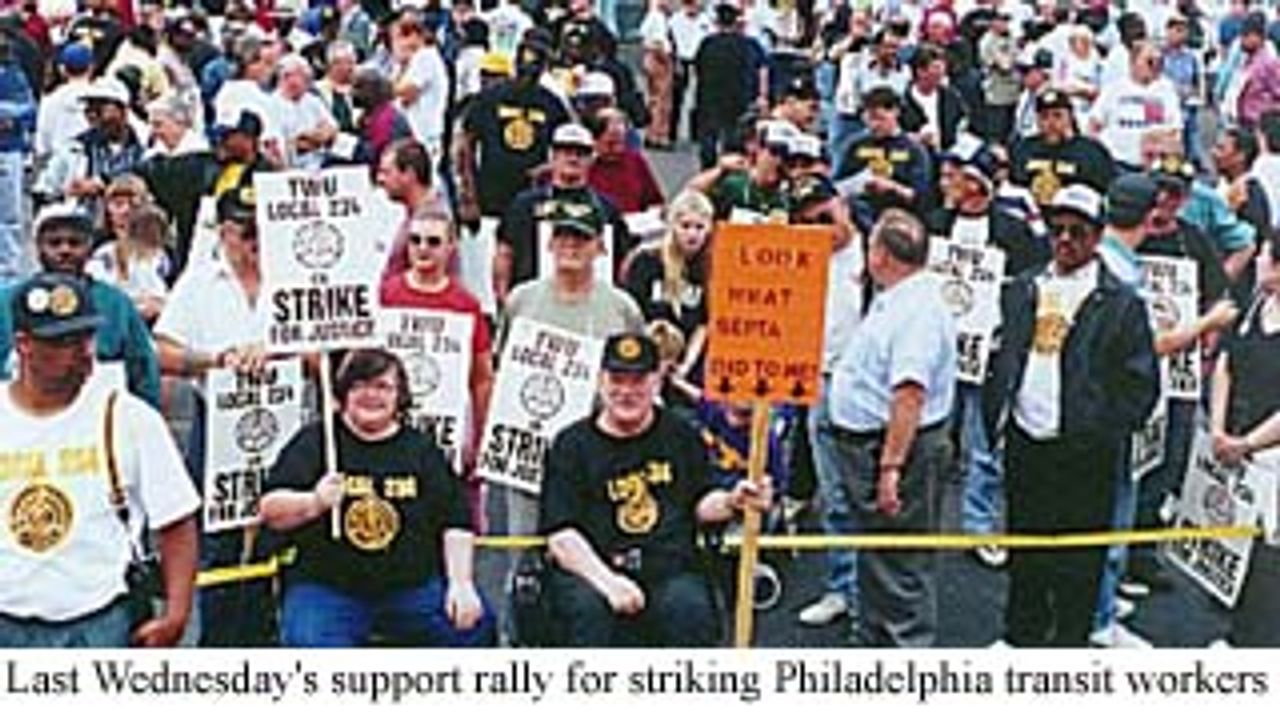 The strike by 5,200 Philadelphia transit workers entered its twelfth day with no negotiations scheduled between the Transport Workers Union and the Southeastern Pennsylvania Transit Authority (SEPTA).
The strike by 5,200 Philadelphia transit workers entered its twelfth day with no negotiations scheduled between the Transport Workers Union and the Southeastern Pennsylvania Transit Authority (SEPTA).
Philadelphia’s Democratic Mayor Ed Rendell met with TWU leaders on Thursday in an unsuccessful attempt to get the union to resume negotiations. Rendell has openly sided with the transit authority in its attack on the striking workers, who operate the city’s subways and trolleys which serve some 500,000 passengers daily.
Rendell said he will refuse to sign legislation pending in the City Council which would cut off city funding for SEPTA for the duration of the strike. The fund cutoff would cost the transit authority millions of dollars. Last week the City Council voted unanimously to support a union proposal to end the walkout and send disputed issues to binding arbitration.
On Wednesday thousands of SEPTA strikers rallied at a major subway and bus terminal in northeast Philadelphia. Top union officials, including AFL-CIO Secretary-Treasurer Richard Trumka and TWU International President Sonny Hall, spoke before the striking workers.
While the union leaders heaped scorn on Mayor Rendell, a politician elected with union support, none of them made any connection between the mayor’s anti-labor policies and the right-wing policies of the Democratic Party as a whole. Union officials restated their call for binding arbitration and promoted the notion that the workers could win by relying on the Democrats on the City Council to pressure the mayor. The purpose of this diversion, besides heading off a far wider mobilization of labor in Philadelphia, is to keep the workers tied to the Democratic Party.
Opinion polls taken during the strike have consistently shown strong public support for the workers. A recent poll conducted by the Philadelphia Daily News showed that 58 percent sided with the strikers despite the inconvenience caused by the walkout.
TWU Local 234 struck SEPTA June 1, shutting down the fourth largest transit system in the United States. On June 8 strikers picketed railways that link the city and suburbs, which were not previously affected by the walkout. Engineers and conductors honored the picket line, disrupting service for 45,000 riders. SEPTA had added more cars to the suburban lines as a means of undermining the effectiveness of the strike. Local 234 President Steve Brookens later ordered the pickets removed in response to a court order.
SEPTA is demanding 47 different concessions from the workers, including the addition of more part-time employees and a reduction in health insurance benefits. SEPTA is also seeking to privatize parts of the transit system. Management has stated its intention of operating buses and trains with nonunion personnel.
The World Socialist Web Site interviewed workers at Wednesday’s rally. Sean Sharpe, a bus operator, said, “Right now it’s not going anywhere. They are still not negotiating. They better not try to run the subways because that will bring out all the unions in the city. The main issue is that they’re trying to use part-timers. They want to fire you if you fail a drug test—that isn’t right either. I don’t use drugs, but if I am at a party where someone is using drugs, I could pick it up in the air and be fired if I tested positive.”
R. Sanborn, a cashier, said, “They want to take away everything we have won over the years. If they hire part-timers this job will go under. You will have to get three jobs to support your family. Most part-timers would only work 20 hours per week. They want to automate my cashier job. They want to change us to property attendants at the stations. We would do porter work, such as cleaning, and help people having problems with machines. They would need a lot fewer people.”
Another cashier, Dennis Miociche, said, “We are really united. We are in for the long haul. They say they care about the public. If they do, why don’t they go to binding arbitration? We know we might lose something that way, but SEPTA wants it all.
“If I get hurt and miss work for six months, my family has no more benefits. Why? All we want is to keep what we have. All these issues came up in past contracts. We fought them then, now they want to take everything back. We went out for 44 days in 1977 for a nickel that they took away anyway. There is no way they are going to take what we worked for all these years.”
Subscribe to the IWA-RFC Newsletter
Get email updates on workers’ struggles and a global perspective from the International Workers Alliance of Rank-and-File Committees.
